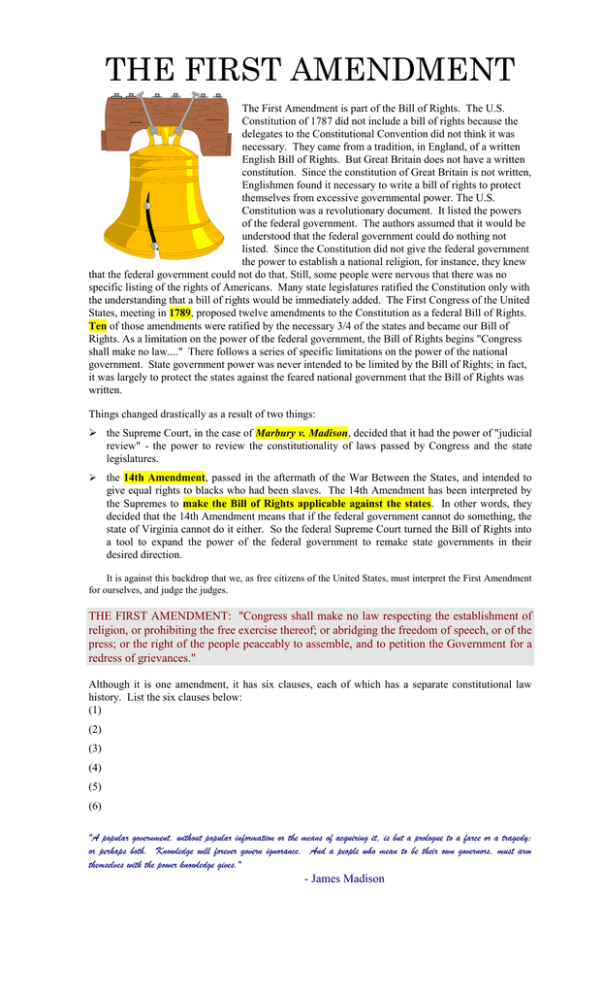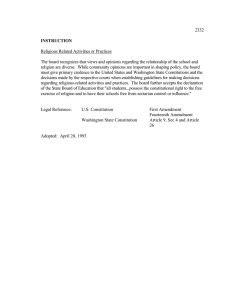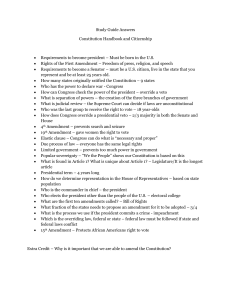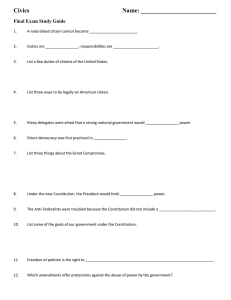THE FIRST AMENDMENT
advertisement

THE FIRST AMENDMENT The First Amendment is part of the Bill of Rights. The U.S. Constitution of 1787 did not include a bill of rights because the delegates to the Constitutional Convention did not think it was necessary. They came from a tradition, in England, of a written English Bill of Rights. But Great Britain does not have a written constitution. Since the constitution of Great Britain is not written, Englishmen found it necessary to write a bill of rights to protect themselves from excessive governmental power. The U.S. Constitution was a revolutionary document. It listed the powers of the federal government. The authors assumed that it would be understood that the federal government could do nothing not listed. Since the Constitution did not give the federal government the power to establish a national religion, for instance, they knew that the federal government could not do that. Still, some people were nervous that there was no specific listing of the rights of Americans. Many state legislatures ratified the Constitution only with the understanding that a bill of rights would be immediately added. The First Congress of the United States, meeting in 1789, proposed twelve amendments to the Constitution as a federal Bill of Rights. Ten of those amendments were ratified by the necessary 3/4 of the states and became our Bill of Rights. As a limitation on the power of the federal government, the Bill of Rights begins "Congress shall make no law...." There follows a series of specific limitations on the power of the national government. State government power was never intended to be limited by the Bill of Rights; in fact, it was largely to protect the states against the feared national government that the Bill of Rights was written. Things changed drastically as a result of two things: the Supreme Court, in the case of Marbury v. Madison, decided that it had the power of "judicial review" - the power to review the constitutionality of laws passed by Congress and the state legislatures. the 14th Amendment, passed in the aftermath of the War Between the States, and intended to give equal rights to blacks who had been slaves. The 14th Amendment has been interpreted by the Supremes to make the Bill of Rights applicable against the states. In other words, they decided that the 14th Amendment means that if the federal government cannot do something, the state of Virginia cannot do it either. So the federal Supreme Court turned the Bill of Rights into a tool to expand the power of the federal government to remake state governments in their desired direction. It is against this backdrop that we, as free citizens of the United States, must interpret the First Amendment for ourselves, and judge the judges. THE FIRST AMENDMENT: "Congress shall make no law respecting the establishment of religion, or prohibiting the free exercise thereof; or abridging the freedom of speech, or of the press; or the right of the people peaceably to assemble, and to petition the Government for a redress of grievances." Although it is one amendment, it has six clauses, each of which has a separate constitutional law history. List the six clauses below: (1) (2) (3) (4) (5) (6) "A popular government, without popular information or the means of acquiring it, is but a prologue to a farce or a tragedy; or perhaps both. Knowledge will forever govern ignorance. And a people who mean to be their own governors, must arm themselves with the power knowledge gives." - James Madison APPEARANCE AND REALITY It looks simple. But, in operation, the First Amendment is anything but simple. Memorize the language of the Amendment. Now let's take a look at how it works in reality. H.R. 10306 In 1966, young people were heavily involved in burning draft cards in order to protest the Vietnam War. [Draft cards were required to be in one's possession "at all times," so that one's draft status could be checked.] Rep. Mandel L. Rivers of South Carolina introduced H.R. 10306 which amended section 12(b) of the Universal Military Training and Service Act of 1945 to punish any person who "knowingly destroys (or) knowingly mutilates any draft card. The question is: does this law violate the Constitution's prohibition of any law which abridges "the freedom of speech" of any person? Is draft card burning "speech"? In Stromberg v. California, 283 U.S. 359 (1931) the Supreme Court said that the First Amendment protects one's right to display the Soviet flag as a political protest. The maintenance of the opportunity for free political discussion to the end that government may be responsive to the will of the people and that changes may be obtained by lawful means, an opportunity essential to the security of the Republic, is a fundamental principle of our constitutional system. (Mr. Chief Justice Hughes) In West Virginia Board of Education v. Barnett, 319 U.S. 624 (1943), the Supreme Court said that the free speech clause prohibited the states from ordering a Jehovah's Witness to salute the American flag in a public school ceremony. Justice Jackson wrote There is no doubt that, in connection with pledges, the flag salute is a form of utterance. Symbolism is a primitive, but effective way of communicating ideas.... ... Those who begin coercive elimination of dissent soon find themselves exterminating dissenters. Compulsory unification of opinion achieves only the unanimity of the graveyard. ... We set up government by consent of the governed, and the Bill of Rights denies those in power any legal opportunity to coerce that consent. Authority here is to be controlled by public opinion, not public opinion by authority. If there is any fixed star in our constitutional constellation, it is that no official, high or petty, can prescribe what shall be orthodox in politics, nationalism, religion, or other matters of opinion or force citizens to confess by word or act their faith therein. We think the action of the local authorities...transcends constitutional limitations of their power and invades the spheres of intellect and spirit which it is the purpose of the First Amendment to our Constitution to reserve from all official control. In Tinker v. Des Moines School District, 393 U.S. 503 (1969), the Court cited the above two cases in holding that public school pupils were constitutionally entitled to wear black armbands to protest U.S. involvement in Vietnam. UNITED STATES v. O'BRIEN Congress passed H.R. 10306. On the morning of March 31, 1966 David Paul O'Brien and three others burned their Selective Service registration certificates on the steps of the South Boston (Mass.) courthouse. O'Brien was convicted of violating §12(b) of the Universal Military Training and Service Act, as amended by H.R. 10306. O'Brien claimed the law was unconstitutional because it restricted his freedom of speech in violation of the First Amendment. Before you decide, consider the words of Justice Goldberg in Cox v. Louisiana, 379 U.S. 536 (1956) The rights of free speech and assembly, while fundamental in our democratic society, still do not mean that everyone with opinions or beliefs to express may address a group at any public place and at any time. The constitutional guarantee of liberty implies the existence of an organized society maintaining public order, without which liberty itself would be lost in the excesses of anarchy. The Court, in that case, held that civil rights demonstrations could be regulated with regard to the time, place and manner of the demonstration. The right of free speech, like other rights which we enjoy, is not absolute. As Justice Oliver Wendell Holmes, Jr. once wrote, There is no right to yell 'fire' in a crowded theatre. LET'S PRETEND Pretend that you are a Supreme Court justice deciding the case of United States v. O'Brien. You want to be faithful to your oath of office; you believe that means being faithful to the Constitution and to the precedents of the Court (the previous cases mentioned above). In order to overturn the conviction of O'Brien and his cohorts, therefore, you must decide two issues: ISSUE #1: Is draft card burning "speech" within the meaning of the First Amendment? ISSUE #2: If draft card burning is "speech" within the meaning of the First Amendment, is the limitation on O'Brien's free speech right in this case justified by some compelling governmental interest?





